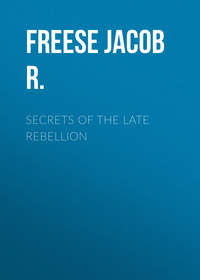Sadece Litres'te okuyun
Kitap dosya olarak indirilemez ancak uygulamamız üzerinden veya online olarak web sitemizden okunabilir.
Kitabı oku: «Secrets of the Late Rebellion», sayfa 18
Bir şeyler ters gitti, lütfen daha sonra tekrar deneyin
Türler ve etiketler
Yaş sınırı:
12+Litres'teki yayın tarihi:
27 eylül 2017Hacim:
320 s. 1 illüstrasyonTelif hakkı:
Public Domain